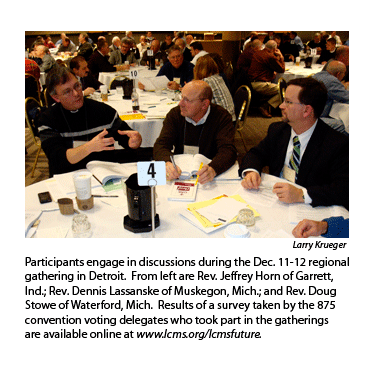By Linda C. Hoops
Convention delegates who attended the regional gatherings hosted last winter by the Office of the President generally gave a “thumbs up” to all but one of the 70 recommendations of the Blue Ribbon Task Force on Synod Structure and Governance.
The results of the survey taken by the 875 voting delegates who participated in the gatherings were released by the President’s Office on March 12, and are available on the home page of the task force Web site at www.lcms.org/lcmsfuture.
The gatherings — held in Denver; Detroit; Madison, Wis.; Minneapolis; Boston; Newport Beach, Calif.; Atlanta; Dallas; and St. Louis — were designed to allow delegates to the Synod’s 2010 convention in Houston to learn how th e Synod is currently structured and to better understand the task force’s recommendations.
e Synod is currently structured and to better understand the task force’s recommendations.
“The process followed by the task force was focused on the goal of building consensus in regard to potential structure and governance amplifications and revisions,” Rev. Larry Krueger, assistant to the president, told Reporter. “The survey results indicate that this consensus building process is on target.”
Some 1,250 delegates are expected to take part in the convention, July 10-17 in Houston, spending the first two business days (July 11-12) determining which of the task force’s proposals — fine-tuned and presented as resolutions — will best prepare The Lutheran Church–Missouri Synod to carry out its mission in the years ahead.
Those attending the regional meetings were asked to respond to the recommendations by checking “Strongly Agree,” “Agree,” “Not Sure,” “Disagree,” or “Strongly Disagree.” In the survey’s summary, “Strongly Agree” and “Agree” were grouped together as were “Strongly Disagree” and “Disagree.”
The only recommendation that received a larger percentage of “Disagree” votes than “Agree” votes (52 percent to 38 percent) states, “Congregations with more than 1,000 confirmed members are entitled to two additional voting delegates, at least one of those additional delegates being a layperson.”
In his January response to the task force report, Synod President Dr. Gerald B. Kieschnick indicated he also did not favor this recommendation, stating, “It is not clear to me whether this proposal is a high priority for the congregations that would be afforded this privilege, and it does not appear to be contributing to a greater spirit of harmony in our Synod.”
The recommendation to establish a fixed number of national convention delegates received a favorable response with 59 percent agreeing and 29 percent not agreeing, and 13 percent “Not Sure.” A subsequent related recommendation to set that number at 650 received an equal number of agree/disagree votes, 40 percent for both, with 20 percent voting “Not Sure.”
The survey shows that delegates favor a major recommendation coming out of the report that would eliminate the Synod’s seven program boards and two of its six commissions and consolidate them into two advisory commissions, one for National Mission and one for International Mission.
“The enhanced understanding about the task force proposals on the part of the convention delegates will bring meaningful discussion to the convention floor,” Krueger said. “At the same time, the floor committee will be knowledgeable about the feelings of the delegates in regard to specific proposals and, based on the feedback it has received to date — in addition to the convention overtures and the feedback it will receive based on the overtures — will present resolutions for consideration that best reflect the overall consensus already achieved.”
Kieschnick said he has been encouraged by the churchmanship shown during the gatherings. “The collegiality so broadly exhibited at the nine regional gatherings was a reflection of how the people of the Synod can work together and walk together for the greater goal of the mission of our Lord.”
Linda C. Hoops is a freelance writer and a member of Lutheran Church of the Resurrection, Sunset Hills, Mo.
Posted March 24, 2010



